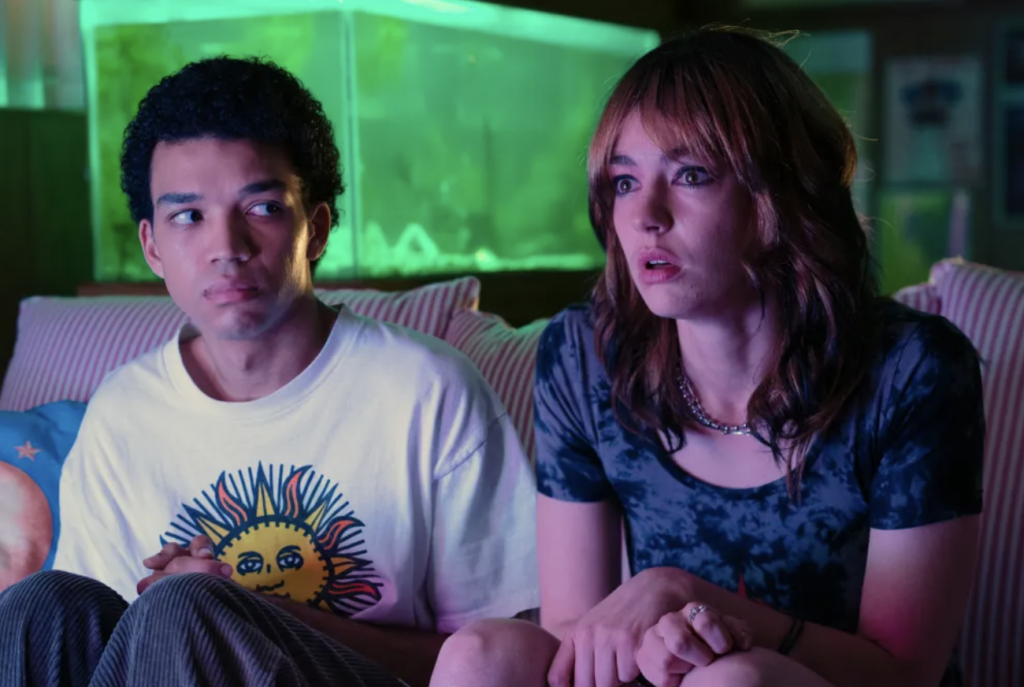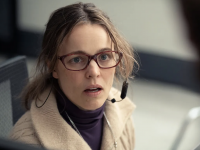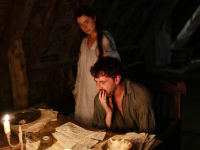“I Saw The TV Glow” is a haunting and surreal exploration of identity, nostalgia, and the eerie power of television. Jane Schoenbrun crafts a dreamlike coming-of-age tale that lingers long after the screen fades to black.
It’s a funny thing. I’m a boring, average, middle-aged white guy born and raised in the UK, and for thirty-odd years I’ve been happy to explore all kinds of cinema born of places and perspectives from where I most definitely do not hail myself: Asia, Africa, South America…heck, even the French new wave of the 50s and 60s. Take my word for it: I’m definitely no Alain Delon. The more I’ve immersed myself in these perspectives the more they’ve enriched my faculties, so quite why I’ve never applied the same rationale to cinema from a queer perspective I do not know. Honestly, it probably is an unconscious bias.
When the call went out for blog content that helped celebrate Pride month I thought I’d take a step outside the comfort zone I hadn’t even realised I was living in, especially as I Saw the TV Glow is a film that had been bothering the periphery of my to-do list. And do you know what? I’m really glad I did.
Set in the mid-90s, I Saw the TV Glow is a suitably off-kilter look into the lives of two suburban teens, Maddy (Jack Haven) and Owen (younger self briefly portrayed by Ian Foreman, and for the majority of the movie Justice Smith), who find a common bond through the late night cable TV teen show The Pink Opaque, which itself is an off-kilter look at the travails of young suburban teens.
From the get-go the older Maddy makes it clear to Owen that they only like girls, which is fine by Owen who doesn’t really know who, what or if they like anything other than TV. The pair maintain something of a social distance for a year or so, though Maddy leaves VHS tapes of each Saturday’s episode for Owen, whose mother and step dad don’t allow him to watch (“isn’t that a show for girls?”).
Shortly thereafter, Maddy vanishes without trace, the only clue to her departure being a burning CRT TV left on the front lawn, and when she finally re-appears some eight years later it’s with news for Owen about the nature of the show they both loved so much as teenagers.
With an atmosphere and aesthetics that immediately evoke shows like Stranger Things, and more than a hint of Twin Peaks for good measure, I found I Saw the TV Glow way more immediately accessible than I had assumed would be the case. Writer-director Jane Schoenbrun clearly has real confidence about their vision, not just aesthetically but also thematically and emotionally; it’s testimony to great writing and direction that a movie centred on a specific experience of gender identity really ought to resonate with a much broader audience.
The performances here are wonderful, particularly from the leads, but also from a supporting cast that counts the brilliant Danielle Deadwyler and, I kid you not, Fred Durst among its ranks. The latter in particular is surprising, in a largely wordless role the spectre of which hangs over Owen like a thundercloud waiting to discharge lightning into his life. Again, I get the impression that Shoenbrun knew exactly who they wanted in every role, and exactly what a choice like Durst would subconsciously say in the context of the movie’s setting.
There’s a brilliant soundtrack too, from bands I’m not familiar with, but several of whom I’ve since added to my discovery playlists, all apparently tracks which Schoenbrun commissioned from artists with a personal resonance.
Ultimately I think I Saw the TV Glow is several things operating on several levels. If you care to check under the bonnet in analytical fashion it’s a story of how media can both inform and reflect on who we are at a time in our lives when we don’t really know the answer ourselves. Later in the movie Owen revisits the show as an adult, finding that it has been stripped of it’s nostalgia and is nothing like he remembered, although I’m not convinced it isn’t Owen himself who’s changed.
More broadly this is a coming of age tale about that feeling of drowning in uncertainty at a time in our lives where everything seems possible, if only we could find our way to shore. You’ll notice there’s something that neither of those assessments mentions, which is why I feel quite silly having swerved this vein of cinema for so long.
If, like me, you were once an awkward, insecure teenager with no clue as to the who, when, what, where and general how of life then I’d be willing to be there will be a resonance here; in some ways the biggest difference between myself and a character like Maddy is that it took me until my mid twenties to work up the bravery to leave home. If a boring old heteronormative fart like me can relate to this, I can only imagine what it might mean to a more diverse audience. Thoroughly recommended.
Author: Ewan, Chester Store







